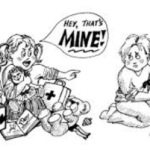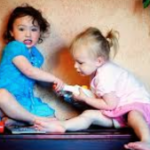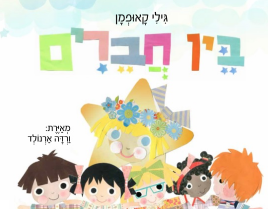Sharing is immensely difficult for adults. There are so many things that we refuse to share, our clothes, our toothbrush, our lovers! For children sharing is developmentally impossible.  The concept is weird. Children are egocentric, which means that they are at the centre of their own universe, they are not developmentally able yet to exercise empathy and view the world through the eyes of another human being. This makes it very difficult to understand the feelings or needs of others.
The concept is weird. Children are egocentric, which means that they are at the centre of their own universe, they are not developmentally able yet to exercise empathy and view the world through the eyes of another human being. This makes it very difficult to understand the feelings or needs of others.
We understand at Rainbow, that is our role to support children’s development, as we are sure you understand it is your role also as parents. 
Modelling good sharing skills is one way we can encourage the kinds of values and behaviours that we would like our children to aspire to. However, having realistic expectations, which are developmentally appropriate is important for children’s self-esteem and sense of self-worth.
Toddlers are in an egocentric phase of development, just starting to recognise themselves as individuals with their own things. They are beginning to explore what it means to possess something, and they haven’t quite grasped the idea that some things belong to other people. That’s why you hear them saying “MINE”!
 Give-and-take is a very hard concept for children who have yet to gain a clear understanding of time or a sophisticated grasp of language. “You can have that back in a few minutes” means little to a two-year-old.
Give-and-take is a very hard concept for children who have yet to gain a clear understanding of time or a sophisticated grasp of language. “You can have that back in a few minutes” means little to a two-year-old.
Yes, it’s perfectly normal for children in gan to find sharing tricky. Children generally understand the concept of sharing at about age three. But it will take a while longer before they are prepared to do it!
Although by aged 3, children are starting to develop empathy and know that they need to take turns, they aren’t mature enough to resist all of their impulses and grab, cry or even push. Most three-year-olds and four-year-olds put their own needs first, and can get upset when the needs of others get in the way.
Beneath the surface, though, children’s sharing skills are maturing. Part of this is because of how much they love being praised by the trusted adults around them when they do take turns.
Sharing is a complex skill that takes time, effort and positive reinforcement. Children will learn by others also, for example if they snatch from someone else, usually a consequence will follow – the other child will snatch back, or withdraw from the play. Sometimes this is more important that adult invention. At Rainbow we generally take a high observation, low intervention approach. This means supporting children to resolve things themselves, watching what they do and how they behave, and making interventions that are thoughtful, developmentally appropriate and enabling. You won’t hear Rainbow staff saying “Give that back… he had it first”, rather we will take a problem-solving approach. Often this may be to replenish the space with additional resources, so that there are enough for everyone.
Of course, the complexities of sharing and co-operative play spill over outside of gan to play dates, and interactions with children at home, in the park and everywhere else! It can sometimes be hard for parents to know exactly how to respond or what to do. We
recommend that clear communication, realistic expectations and reassurance are the  most helpful tools you have. Remember, that children only develop real sharing capabilities by the age of 7 or 8 years old. Sharing books or stories with your children about communication in relation to sharing and turn taking can help children practice these skills. We have recently come across a new book in Hebrew, written by a parent of children which explores some of these issues.
most helpful tools you have. Remember, that children only develop real sharing capabilities by the age of 7 or 8 years old. Sharing books or stories with your children about communication in relation to sharing and turn taking can help children practice these skills. We have recently come across a new book in Hebrew, written by a parent of children which explores some of these issues.
